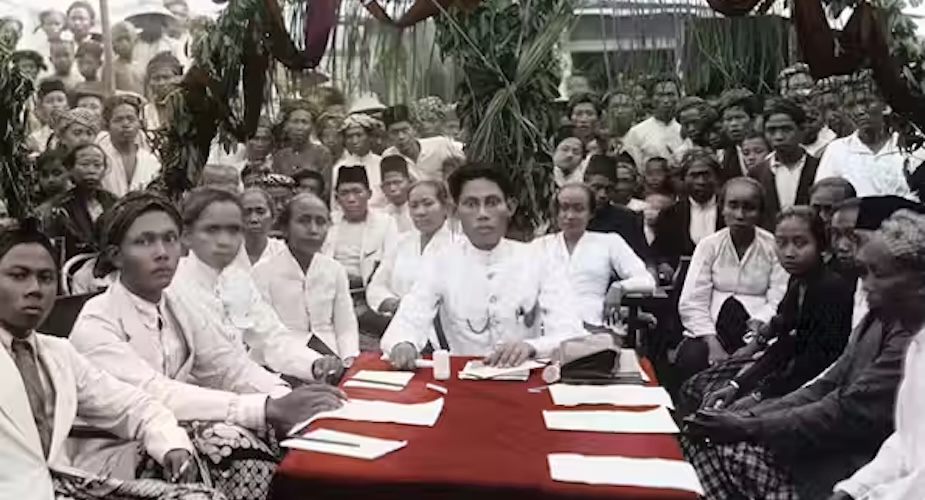DJOHAN EFFENDI explores the paradox of young progressives in Indonesia's most traditional Islamic organisation.
Traditionalist Islam in Indonesia is producing an interesting phenomenon. Young Nahdatul Ulama cadres emerging now are far more responsive towards new ideas and the challenges of modernity, including democratic reform, than their seniors.
Contrary to conventional expectations, when kiai orulama combine a mastery of the classical religious sciences with a certain level of 'modern' education they obtain considerable social insight and develop a positive attitude towards social change. Making this all the more interesting is an opposite phenomenon now occurring among modernist Muslim organisations, where there is a tendency towards a more closed minded, frequently even reactionary attitude particularly towards 'Western' ideas.
Transformation
A great influence on the younger generation within NU is the emergence of various non-government organisations (NGOs) with either direct or indirect religious affiliations. Since the 1970s NGO activists concerned with social transformation have realised that the religious schools (thepesantren) represent the most strategic institutions in Indonesia to promote community development in rural areas. Pesantren teachers are known as kiai.
The most important institute to facilitate the intellectual development, through discourse, of young kiai is the Centre for the Development of Pesantren and Society, P3M. This centre engages in cooperative ventures with pesantren, intending to make them centres for community development. P3M's activities have been important in redressing misgivings in the minds of young NU cadres about NU's social worth after the disillusioning years in the political arena between 1952 and 1984.
Engaged
A desire among NU students (santri), kiai, and the faithful generally to return the movement to its original socially engaged and reformist character gave birth in 1984 to a move abandoning NU's role as political party and re-embracing NU's original 1926 charter (khittah). The return opened the way for pesantren to cooperate with different organisations without having to constantly consider the party-political implications.
NU's decision to return to the khittah encouraged youngkiai to concentrate their activities around their pesantren, not just in teaching and preaching but also in community development. They joined a broad social network, at a regional and even a national level.
P3M was established in 1983 by several kiai and NGO leaders, including Abdurrahman Wahid, now chairman of NU. It has played an important role in facilitating a national network of young kiai.
A central activity has been a series of regular seminars and workshops, called halaqah, focusing on pressing social issues. The halaqah continue an earlier series of religious discussions known as bahth al kitab, literally 'the discussion of books'. They were organised by a young NU intellectual, Masdar Farid Mas'udi, now the chairman of P3M, and were fully supported by Abdurrahman Wahid.
Critical
In these discussions religious texts which had been sacralised in pesantren usage were discussed critically. This had never been done before, at least not by older kiai and never openly. Not surprisingly they resulted in critical reactions from some older kiai, who considered them a serious deviation from NU's tradition and absolutely against the ethics of thesantri. For this reason the organisers decided to stop them.
Nevertheless many younger kiai felt there was a need for a forum to discuss social issues from a religious perspective. That is how P3M came to organise the halaqah discussions.
The range of topics discussed in these halaqah demonstrated that they were not just religious forums but also socio-political ones. And they were not a purely academic exercise but an effort to understand the real problems of society, with a view to sharing what they were able to do from their perspective as religious leaders.
Quite fundamental, if highly specialised, discussions have been held on the degree of independence a student has in following the teaching of their elders. The way these discussions are eventually resolved will have a significant bearing on the future development of NU.
Theology
On a more practical level, the halaqah have discussed thefiqh of various socio-political matters. The term fiqh literally means jurisprudence, but here it is roughly equivalent to the Christian term theology. So they talked about the fiqh of land, the fiqh of tax, the fiqh of people's representative institutions, and the fiqh of just leadership. The halaqah of 14 and 15 August 1997 took up the very latest and most important socio-political issue in Indonesia: Islam and political violence.
Among the most recent activities initiated by P3M, which is supported by the Ford Foundation, is a forum for woman kiai to discuss feminist issues from a scholarly Islamic perspective. This activity is still in its initial stages and has been organised in only four pesantren so far, but will be followed by others. All these discussions at P3M will certainly play a significant role in future progressive developments within the Indonesian Muslim community.
Djohan Effendi is completing a PhD in religious studies at Deakin University in Geelong, Victoria, Australia.
P3M can be contacted at PO Box 12 JATCL, Jakarta 13000, Indonesia, tel/fax +62-21-809 1617.











